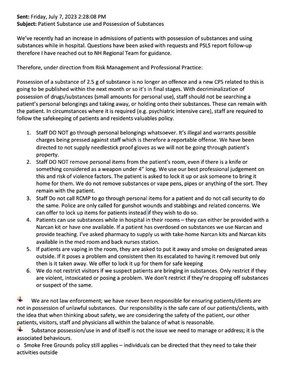B.C. health minister Adrian Dix rises in the B.C. Legislative Assembly to respond to a leaked memo in which hospital workers were told not to confiscate weapons or illicit drugs from patients. PHOTO BY LEGISLATIVE ASSEMBLY OF BRITISH COLUMBIA
Tristin Hopper Published Apr 05, 2024
First Reading is a daily newsletter keeping you posted on the travails of Canadian politicos, all curated by the National Post’s own Tristin Hopper. To get an early version sent directly to your inbox, sign up here.
In one of the more controversial milestones of B.C.’s push to solve addiction via “destigmatization,” a leaked memo has emerged instructing nurses to stop confiscating weapons from hospital patients, and to allow them to do illicit drugs in their rooms.
“Patients can use substances while in hospital in their rooms,” reads a July 2023 memo issued by Northern Health, the provincial health agency serving the region spanning roughly from Prince George to the Yukon border.
Hospital staff are told only to supply the patient with a Narcan kit in case they overdose, and to suggest they do the drugs outside if they happen to be smoking crack, meth or tobacco. “Smoke Free Grounds policy still applies,” it reads.
The measures were announced in response to B.C.’s decriminalization of illicit drugs. Starting on Jan. 31, 2023, any British Columbian caught with personal-use amounts of opioids, cocaine, methamphetamine and MDMA became immune to criminal penalties or even seizure of their drugs.

But the memo also goes beyond drugs in telling hospital staff that patients are allowed to bring in knives and other weapons, so long as they’re “under 4 inches long.”
Hospital workers are also instructed to look the other way when encountering obvious signs of illicit drug dealing. “We do not restrict visitors if we suspect patients are bringing in substances,” it reads, adding, “we don’t restrict if they’re dropping off substances.”
The two-page memo was directed at staff of G.R. Baker Memorial Hospital in Quesnel, B.C.
It became public this week only after it was obtained by B.C. United, the province’s main opposition party.
“Under this NDP government, illicit drug use and, yes, even drug trafficking in hospitals are not just tolerated, but they are endorsed,” said Shadow Minister for Health Shirley Bond in a Wednesday session of the B.C. Legislative Assembly.
Bond’s riding of Prince George-Valemount falls within Northern Health’s jurisdiction. The shadow minister also cited reports of “meth being smoked in a unit just hours after the birth of a newborn baby.”
In response, Health Minister Adrian Dix mentioned only that health worker safety “is a singular priority of all of us” and that his government had hired 320 “relational security officers” to work at B.C. hospitals. Jennifer Whiteside, the Minister of Mental Health and Addictions, defended B.C.’s ongoing decriminalization experiment by saying “it was never intended … to promote unfettered public drug use.”
Speaking to Postmedia, the B.C. Nurse’s Union said that the experience of staff at G.R. Baker Memorial Hospital is not an anomaly. “This is becoming a widespread issue of significant magnitude,” said BCNU president Adriane Gear.
The July 2023 memo was actually issued in direct response to G.R. Baker workers requesting “guidance” after witnessing a noticeable increase in patients with illicit drugs in their possession and “using substances while in hospital.”
On virtually every point, nurses are told that it’s none of their business. The only time they are told to intervene is if someone is violating the hospital’s smoke-free policy, or if their drug dealer is “violent, intoxicated or posing a problem.”
The memo is so emphatic at telling workers not to confiscate illicit drugs from patients that it informs them that the hospital will not be providing “needlestick proof” gloves, as there would be no reason to use them unless staff are “going through patient’s property.”
While the memo’s publication caused a stir in the B.C. Legislature, it isn’t entirely out of character for a province that has prioritized the provision of “low barrier” services wherever possible.
The basic idea is that any stigmatization of drug use whatsoever will prompt addicts to use alone, where they’re at greater risk for fatal overdose.
Decriminalization itself was pitched by B.C.’s NDP government as a measure to “break down the stigma that stops people from accessing life-saving support and services.”
Earlier this year, the B.C. Supreme Court ruled that a ban on doing illicit drugs in playgrounds violated the Constitution because asking addicts to use elsewhere would only promote “lone drug use” which would cause them to die.
Even the province’s “safer supply” system of distributing recreational opioids to addicts has been accused of not being low-barrier enough. In January, Provincial Health Officer Bonnie Henry wrote in a report that opioids urgently needed to be distributed more readily and in more places — with a particular emphasis on Indigenous communities. Henry recommended distributing heroin and fentanyl in a “variety of formulations, including smokeable formulations.”
Low-barrier is also a philosophy that’s been pursued by the province’s housing and shelter services. Since 2017, all shelters run by BC Housing have been ordered to operate as “low barrier” sites in which the consumption and dealing of illicit drugs are tolerated.
While the change has corresponded with a massive spike in violence, disorder and even full-fledged drug dealing rings operating out of BC Housing facilities, the government has defended it as a necessary measure to curb overdose deaths.
“BC Housing has found abstinence-based facilities create barriers for those using substances and are counterproductive to addressing the problem of homelessness,” wrote the B.C. government in a 2020 defence of the policy.





